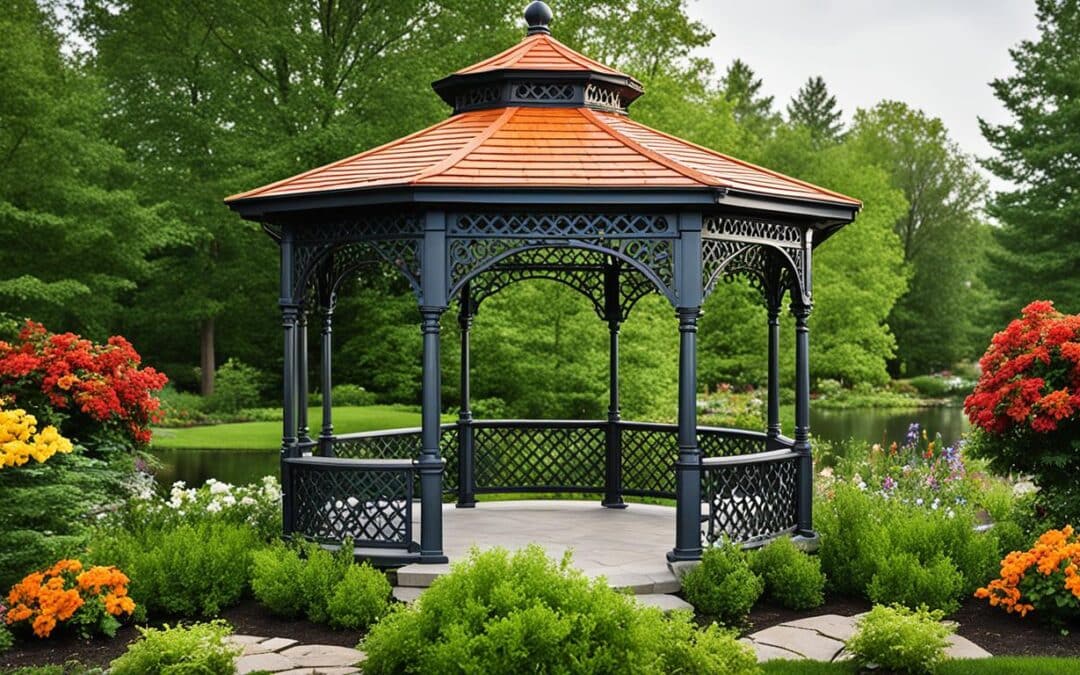Choosing between a gazebo and a pergola depends on your shade needs and style preferences. Gazebos provide complete protection and a historical look with options in wood, stone, or metal. Pergolas offer partial shade with an open roof for plants, enhancing integration with the outdoors. Both enhance outdoor spaces but serve different aesthetic and functional preferences.
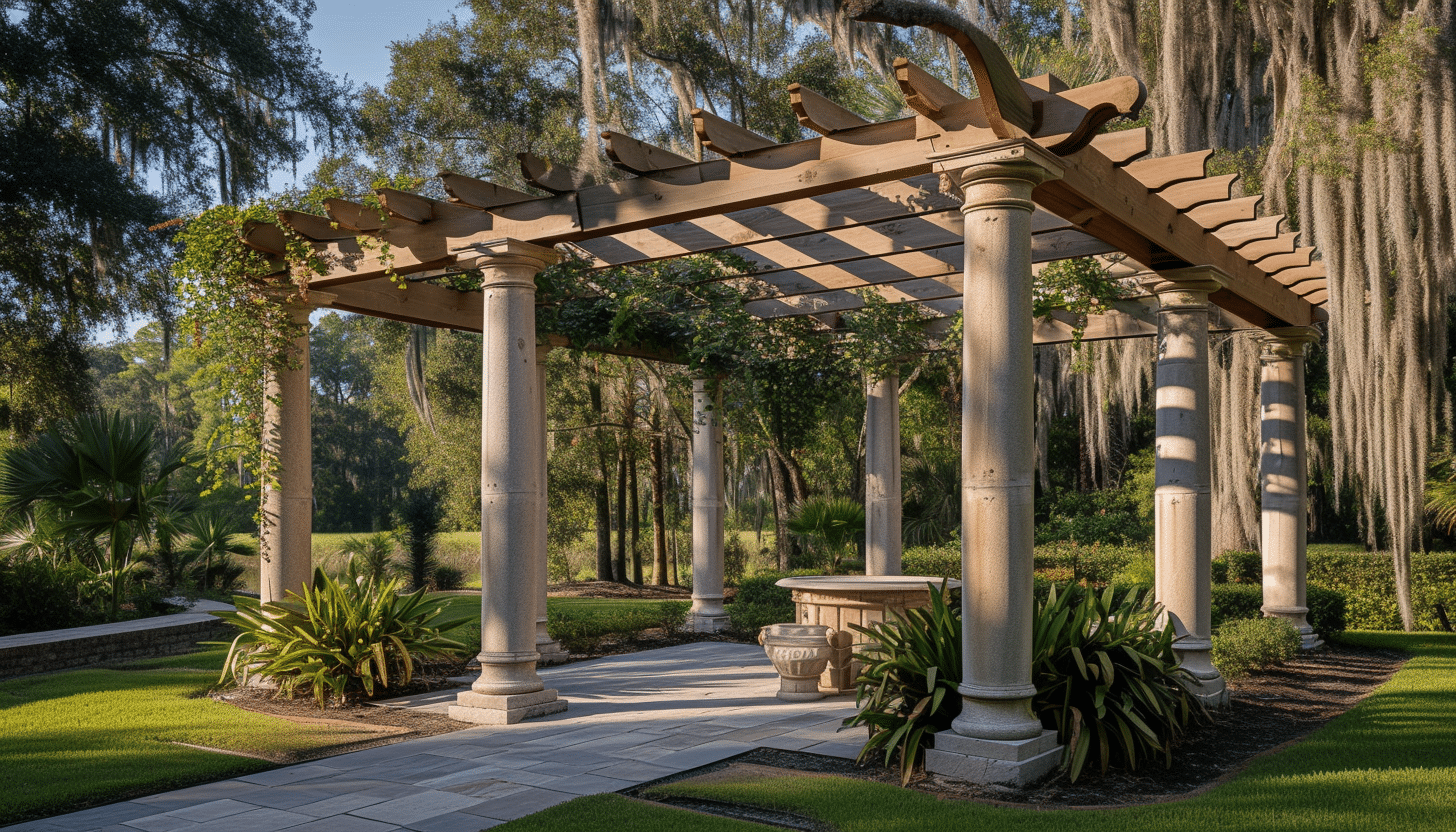
Key Takeaways
- The comparison between a gazebo and a pergola centers on their distinct characteristics and uses in outdoor living spaces.
- While gazebos are standalone structures with a solid roof for full protection against weather, pergolas are either freestanding or attached to a house, with a latticed roof for partial shade.
- Gazebos can be made from a range of materials, including stone, metal, and wood, thereby providing more aesthetic choices.
- Pergolas integrate seamlessly with homes and can support climbing plants, blending indoor and outdoor elements together in garden design.
- When choosing the right structure for your outdoor space, consider your specific design goals and functionality needs.
Understanding the Classic Gazebo for Outdoor Spaces
Gazebos have long been a beloved feature of gardens and parks alike, offering a harmonious blend of aesthetics, functionality, and versatility. Dating back to the Victorian era, their classic designs have evolved to meet the varying demands of modern outdoor spaces.
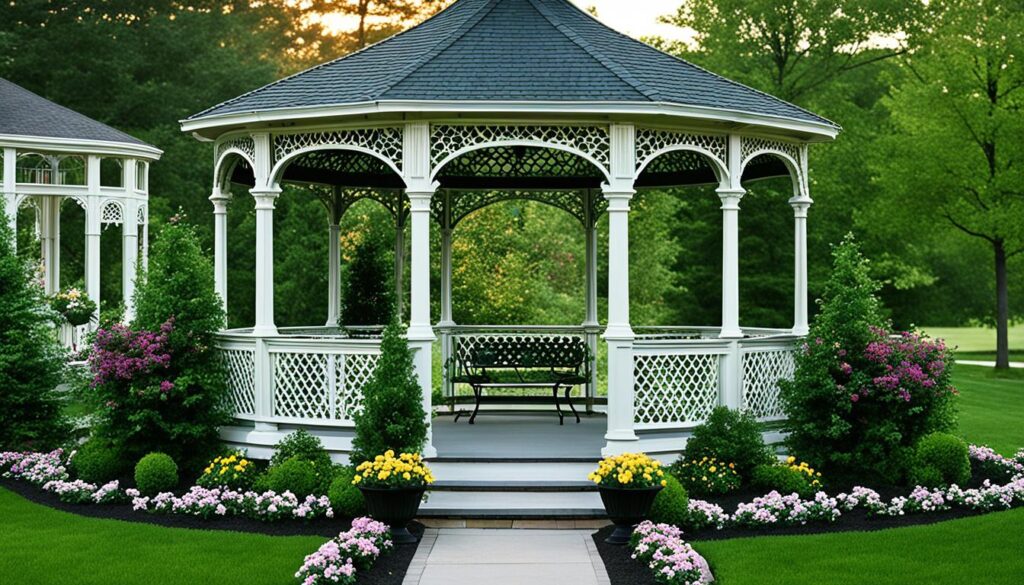
Historical Significance and Design Evolution
The gazebo’s design, stemming from Victorian architecture, captures the essence of elegance and charm with elements such as latticework, finials, and diverse shapes. Adapting to preferred design trends over the centuries, gazebos serve as a bridge between historical tradition and modern sensibilities in today’s garden or park setting.
Material Choices and Built-In Features
Materials play a significant role in a gazebo’s aesthetics and longevity. Choices range from traditional wooden gazebos to resilient metal gazebos to elegant stone gazebos. Each material has its unique attraction and caters to different weather conditions. Most gazebos include built-in seating that presents an inviting space for relaxation and social interaction.
Common Uses in Garden and Park Settings
The gazebo, as an important element of a park or garden, serves a dual purpose. In addition to being a highlight of the landscape, it offers a shaded spot for relaxation and socializing. Its freestanding nature allows homeowners and park planners alike to place it in the most strategic location within their given space, enhancing the functionality and enjoyment of the outdoor living areas.
| Type of Gazebo | Material | Main Benefits | Average Lifespan |
|---|---|---|---|
| Wooden Gazebo | Timber, redwood or cedar | Natural aesthetic, easily customizable | 10-20 years |
| Metal Gazebo | Wrought iron, aluminum, or steel | Exceptional durability, minimalist design | 30-50 years |
| Stone Gazebo | Sandstone, granite, or marble | Superior longevity adds value to a property | 50-100 years |
Exploring the Versatile Pergola in Backyard Design
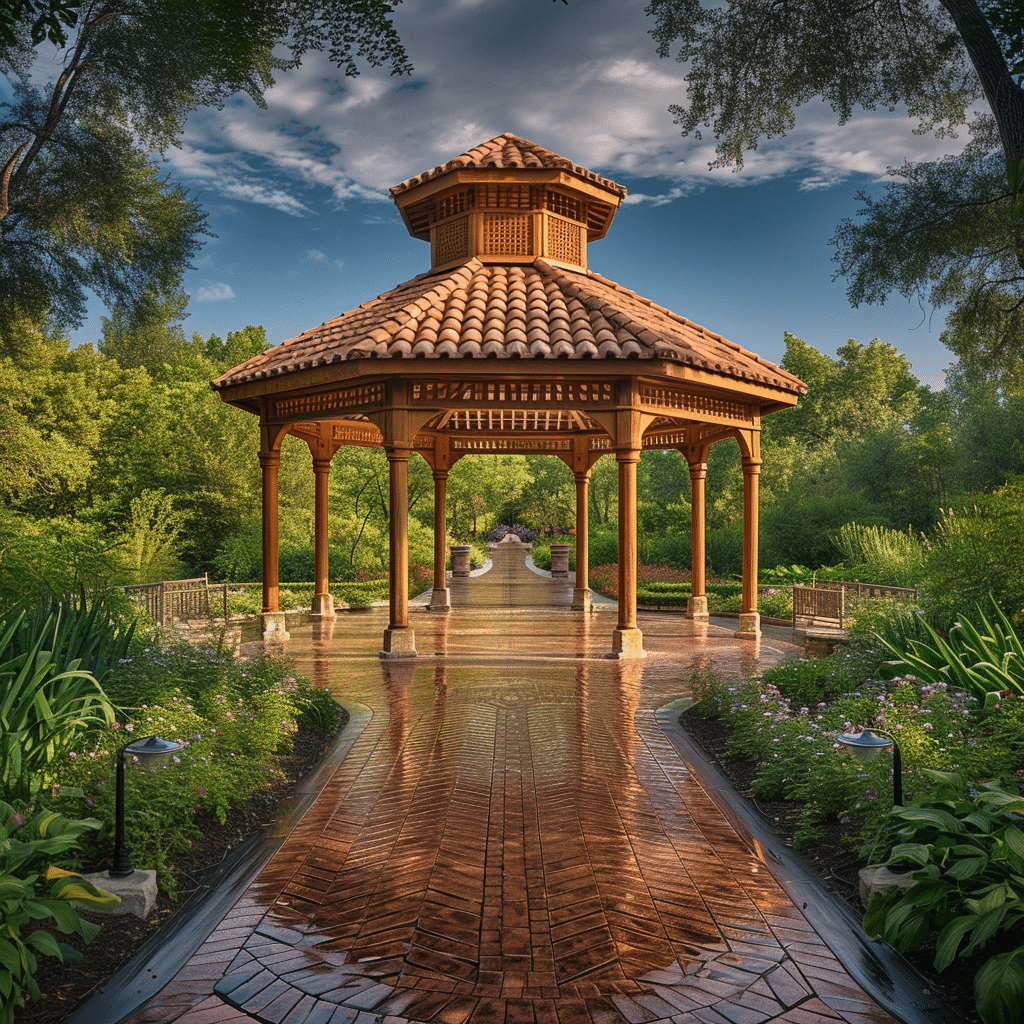
Shaping your outdoor living spaces is an opportunity to express creativity and style. A highly popular option revolves around incorporating pergola structures, versatile entities that have a significant role in backyard design. These structures offer the unique ability to blend with your home’s architecture, impressing with their material versatility and ability to host plant life. Let’s explore more.
Architectural Integration with Homes
Unlike many other garden structures, pergolas can seamlessly integrate with your home. They extend from a wall as an attached structure or stand independently, offering homeowners a myriad of choices for creating shady spaces. As a result, these structures have become quintessential in fostering a harmonious blend between indoor and outdoor environments. Now, evenings on the patio or deck are an entirely new experience, offering shaded comfort right outside your door.
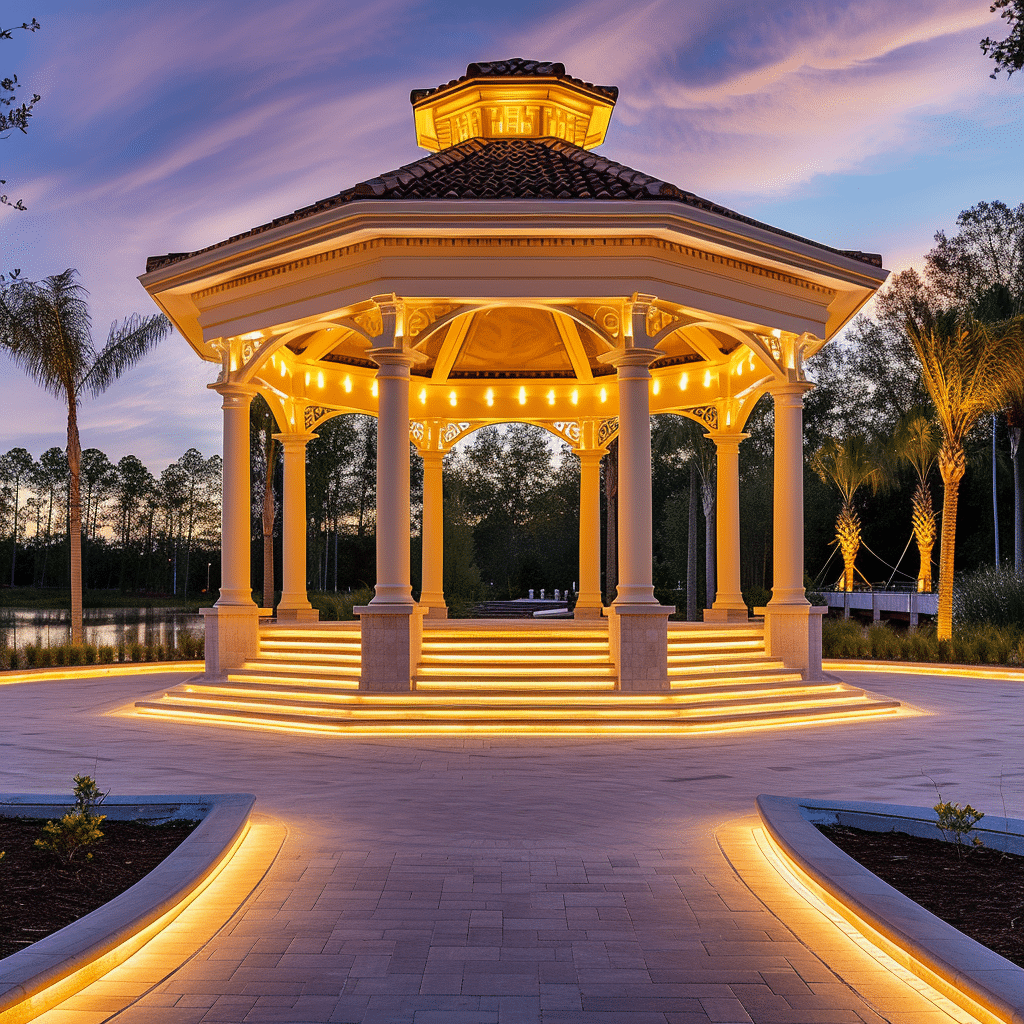
Material Flexibility and Customization Options
Pergolas can be a beautiful reflection of personal taste and style, thanks largely to the wealth of material choices available. Options range from natural wood to modern PVC and enduring metals, malleable resources that keep up with diverse preferences and weather adversities. You can go for an extravagant, ornate design or stick with a clean, minimalistic look to compliment your exterior aesthetics. Add some vibrant greenery, and you will have an outdoor sanctuary that provides privacy and a unique charm.
Enhancing Outdoor Living with Plant Integration
Pergolas serve as a splendid support system for your favorite climbing plants, such as roses, grapevines, and wisteria. These vines wrap around the pillars and lattice, playing up the structure’s functionality beyond just casting shade. Such integration of plant life is a splendid way to boost privacy and create a relaxing, eco-friendly atmosphere in your outdoor living space. It’s a crisp morning coffee routine or a cozy evening retreat, enwrapped in the heavenly scent of your blossoming canopy.
FAQs
What is the key difference between a gazebo and a pergola?
The key differentiator between a gazebo and a pergola is their respective roofs. Gazebos feature a solid roof for complete shade and protection from the elements, while pergolas have an open, lattice-like structure that supports plant life and provides partial shelter.
Is there a significant historical difference between gazebos and pergolas?
Yes, gazebos have a rich history dating back to the Victorian era and have evolved to complement modern garden settings. Pergolas, however, are more contemporary and are used widely today as garden features that blend seamlessly with indoor and outdoor environments.
Which is more versatile in terms of design, a gazebo or a pergola?
While gazebos can be crafted from a range of materials like stone, metal, and wood, pergolas offer more flexible design options. Pergolas can be freestanding or extend from the home, allowing for more customization in terms of placement and use. Furthermore, pergolas support plant integration, adding an additional layer of customization and aesthetic appeal.
Can a pergola withstand harsh weather conditions as well as a gazebo?
While gazebos often hold up better against strong winds and heavy rains due to their solid roofs, pergolas can also be built to withstand harsh conditions. This largely depends on the materials used to construct the pergola, with modern materials like PVC offering greater resilience.
Which structure is better for my garden, a gazebo or pergola?
The choice between a gazebo or pergola hinges on your specific needs and preferences for backyard design and outdoor living spaces. If you desire full protection and built-in seating, a gazebo could be the better option. If you want something that blends with your home and allows for more creative design options, such as plant integration, a pergola might be more suitable.

I’m Elliot Bock, an expert at Total Site Amenities, specializing in transforming outdoor spaces. With a focus on aesthetic and functionality, I work closely with project managers and HOAs to tailor each project to their unique needs. My approach simplifies the complex, making me a trusted partner in crafting personalized outdoor solutions. My passion lies in enhancing community spaces, ensuring every project delivers both beauty and practicality.

